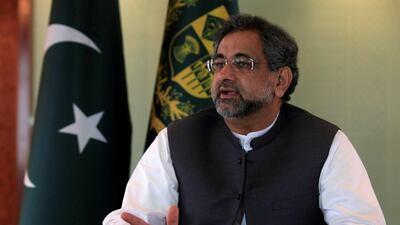Pakistan’s long-standing alliance with the United States has been thrown in doubt as the countries' leaders assemble for the United Nations General Assembly in New York.
It comes after US president Donald Trump lashed out at Pakistan for harbouring "agents of chaos" as he introduced a new Afghanistan strategy last month. US officials are now considering further steps to reduce Pakistan's status as an ally, including targeted sanctions on Pakistani military figures judged to conclude with Afghan insurgents.
Pakistani prime minister Shahid Khaqan Abbasi, who is reported to be likely to meet with US vice president Mike Pence in New York on Tuesday, warned his country would retaliate if its alliance was downgraded.
In an interview with the Financial Times published on Sunday, Mr Abbasi said Pakistan could switch its procurement of fighter jets to China from the US.
“We would like to buy more F16s, but we do have other options,” he said. “We have a long relationship with both the French and the Chinese, and we have been developing the JF-17 alongside the Chinese, which in may ways meets or even exceeds the specifications of the F16.”
_______________
Read more:
Trump's warning to Pakistan over terrorism meets with mixed reaction
Comment: Trump was right to go after Pakistan, but his decision deepens regional faultlines
_______________
The newspaper also reported that Pakistan could restrict US overland access to Afghanistan if it was pushed aside by the US.
“We could make it harder for the US to use supply routes through Pakistan to serve its troops in Afghanistan, and we could stop co-operating on drone attacks. That would make the war in Afghanistan a lot more difficult,” a Pakistan army source told the paper.
The recently installed Pakistani leader criticised the diplomatic pivot by Washington, saying it had left Islamabad scrambling to find out about US policy from newspapers.
“The signals we get from Washington are confusing, but our message is very clear: we are committed to fighting terror and we will continue to fight terror,” Mr Abbasi said.
“All it will do [if the US downgrades Pakistan as an ally] is degrade our efforts to fight terror, and I am not sure if that will work for the US.”
The US has already begun conditioning future aid to Pakistan on progress Islamabad makes in tackling the Haqqani network. The militant group's leadership is Pakistan-based and has helped the Taliban carry out deadly attacks inside Afghanistan, he added.
Mr Abbasi reminded the US that Pakistan has borne the brunt of violence in the so-called war on terror, suffering more than 60,000 casualties since 2001.
Targeted sanctions by Washington against the Pakistani military and intelligence officials are part of an array of options being discussed to pressure Pakistan to change its behaviour, including further aid cuts, US officials said.


